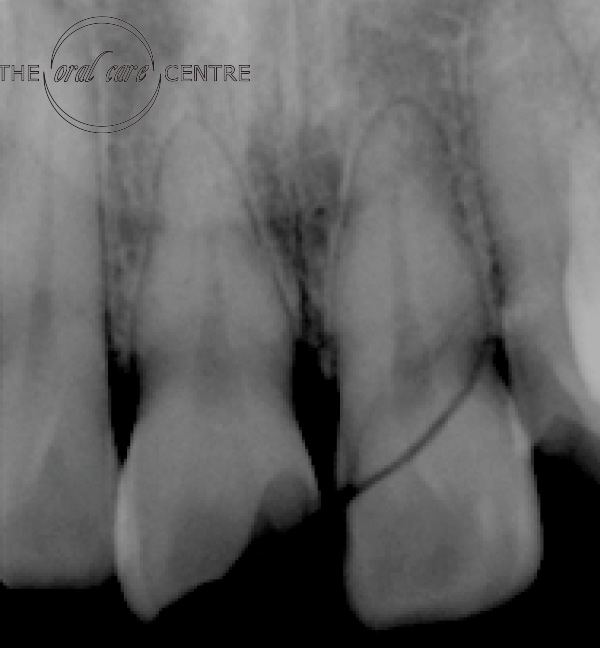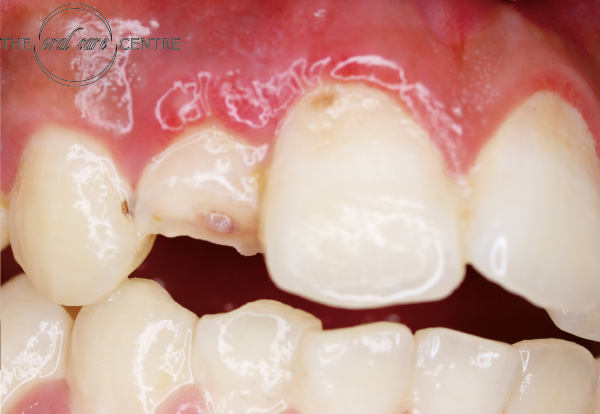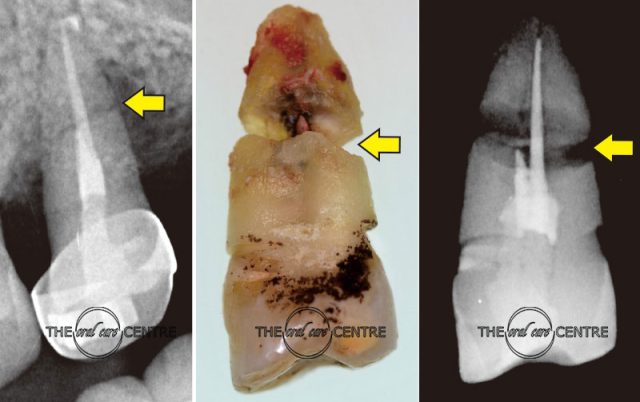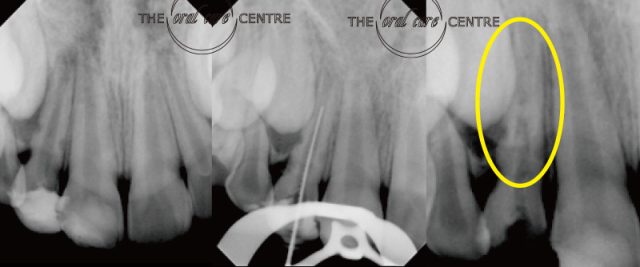Treating dental injuries depends on the type of trauma sustained. Your endodontist will discuss with you the exact type of dental trauma you have, and advise you on the appropriate treatment.
Frequently, a chipped or fractured tooth can be repaired through emergency dentistry, by placing a tooth-coloured filling. If a significant portion of the tooth crown is broken off, an artificial crown may be needed to restore the tooth.


Injuries in the back teeth often include fractured cusps, cracked teeth, and the more serious split tooth. If the crack has extended into the pulp, the tooth may be treated with root canal treatment and crown to protect the tooth and prevent the crack from spreading.
A split tooth, however, is often untreatable, and an extraction is recommended.
Dislocated (Luxated) Tooth
During a luxation injury, a tooth may be pushed sideways, out of, or into its socket. In emergency dentistry, your dentist or endodontist will reposition and stabilise your tooth with a splint.
For them, the endodontist will closely monitor the healing carefully and intervene immediately if any unfavourable changes appear. Therefore, multiple follow-up appointments are likely to be needed.
Knocked-out (Avulsed) Tooth
Having a tooth that is completely knocked out of your mouth is a dental emergency. Take special precaution not to handle the root surface (hold the tooth at the crown part) and if the tooth appears dirty, gently rinse the tooth with water. Take care not to use soap, not to scrub and not to dry the tooth or wrap in tissue or cloth.
- If possible, replant the tooth back into the socket using your fingers and biting down gently to hold it in place.
- If you are unable to replant the tooth, try to put the tooth in an emergency tooth preservation kit (such as Save-a-Tooth® kit), in milk, or at the cheek space in the mouth.
Head to your endodontist or dentist as soon as possible. The likelihood of saving your tooth is related to your management immediately after the injury (length of time the tooth was out of the mouth and the way the tooth was stored before reaching the dentist) and timely treatment at the dental clinic.
Treating Dental Injuries: Avulsed Tooth
Your endodontist or dentist will carefully evaluate the tooth, place it back in its socket (if not already done so), and examine you for any other dental and facial injuries. X-rays will be taken to check for any root or jaw bone fracture and other irregularities under the gums. A stabilisation splint will be placed for a few weeks. Root canal treatment may commence a week or two later. A medication may be placed inside the tooth followed by a permanent root canal filling at a later date.
Your endodontist or dentist will discuss with you the long-term prospects of your replanted tooth, taking all the factors into account.
Root Fractures
The site of the horizontal fracture determines the long-term health of the tooth. The closer the fracture is to the gums, the poorer the long-term success of the tooth. Your endodontist or dentist will discuss with you the treatment options and expected results based on the location of your fracture and whether it is coupled with a dislocation (luxation) injury.

A primary tooth (baby tooth) that is knocked out should NOT be replanted as a replanted primary tooth may cause further and permanent damage to the developing permanent tooth that is growing inside the bone.
What Are The Possible Consequences Following Trauma To The Tooth?
- Resorption – Through its own defense mechanisms, the body begins to reject the tooth in response to the traumatic injury. Some types of resorption are untreatable and may result in the loss of tooth, localised infection and infraocclusion ( the tooth appearing shorter than the neighbouring teeth )
Root resorption progressed in spite of commencement of root canal treatment


- Extensive calcification ( Pulp canal obliteration ) – over time and can be symptomless except for discolouration.
- Discolouration – Teeth with history of trauma commonly require long- term multidisciplinary management
Treating Dental Injuries: Aftercare Instructions
After emergency dentistry treatment for paediatric or adult tooth injury, remember to follow the aftercare instructions provided to you. In general, you’ll have instructions on hygiene, diet, and medications.
Proper Oral Hygiene:
- Keep it clean: Gently brush the injured area with a soft toothbrush or washcloth after every meal.
- Rinse away germs: Use a prescribed Chlorhexidine mouth rinse (0.12%) twice a day for two weeks to prevent infection.
Diet for Healing:
- Soft foods first: Stick to a soft diet for a few days or until you can eat comfortably again.
- Avoid irritants: Stay away from sugary treats and foods that are too hot or cold.
Medications & Monitoring:
- Follow directions: If prescribed, take antibiotics and pain medication as instructed.
- Stay alert: Call your dentist if you notice any changes in tooth color, swelling, or increasing pain. These could signal the need for further treatment, such as a root canal.
Conclusion
Proper management of dental injuries is crucial to ensure the best possible outcome for adults and seniors in Singapore. Seeking immediate emergency dental care, understanding the type of injury sustained, and following aftercare instructions are essential steps in this process. While some injuries may be treated with simple procedures, others, like avulsed or severely fractured teeth, might require more complex treatments such as root canal therapy.
References:
Chipped, broken or cracked tooth – NHS, https://www.nhs.uk/conditions/chipped-broken-or-cracked-tooth/ Accessed October 5, 2024
The 5 Classifications Of Tooth Luxation, https://www.colgate.com/en-us/oral-health/dental-emergencies-and-sports-safety/the-5-classifications-of-tooth-luxation# Accessed October 5, 2024
Tooth Avulsion (Knocked-out Tooth): Prevention & Treatment, https://www.cgh.com.sg/patient-care/conditions-treatments/tooth-avulsion Accessed October 5, 2024
Dental Trauma, https://www.healthhub.sg/a-z/diseases-and-conditions/topics_dental_trauma Accessed October 5, 2024
Taking Care of Your Mouth After Dental Trauma, https://med.umich.edu/1libr/Dentistry/MouthCareAfterTrauma.pdf Accessed October 5, 2024

